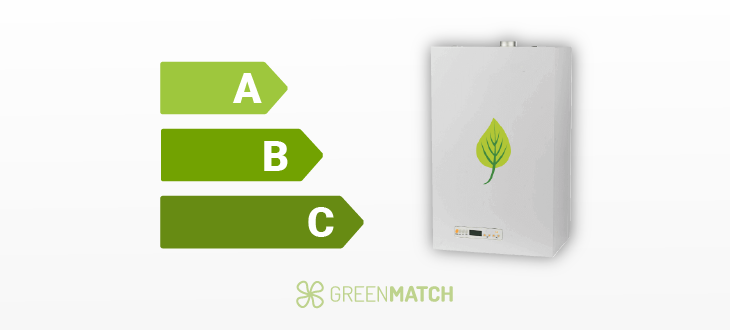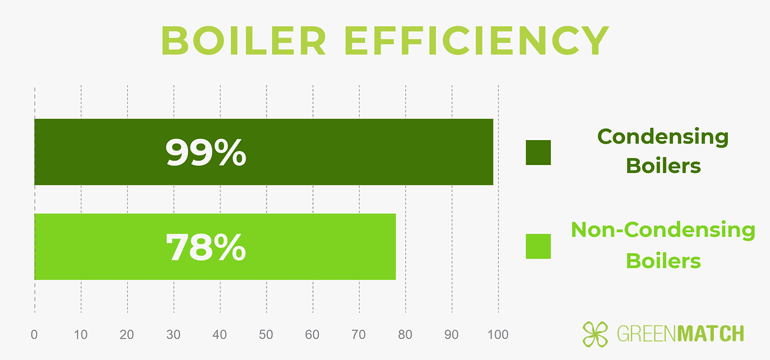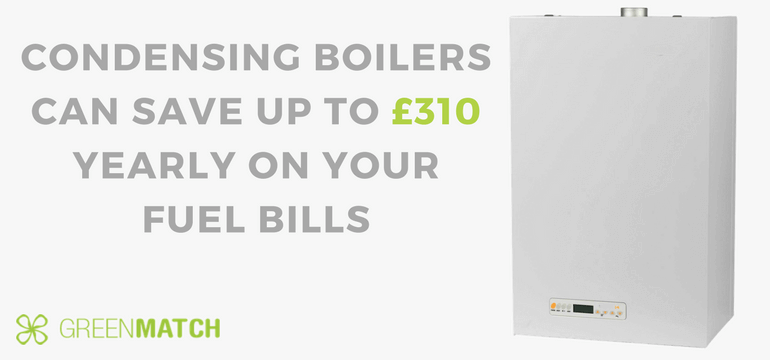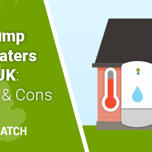Answer these simple questions and we will find you the BEST prices
Which type of solar quotes do you need?
It only takes 30 seconds
100% free with no obligation

Get up to 3 quotes by filling in only 1 quick form

Slash your energy bills by installing an energy efficient boiler

We’ve helped over 500,000 homeowners reduce their carbon footprint
- GreenMatch
- Boilers
- Boiler Comparison
- types
- Condensing vs. Non-Condensing Boilers
Condensing vs. Non-Condensing Boilers

What Are the Differences Between Condensing and Non-Condensing Boilers?
Condensing and non-condensing boilers both burn fuel, such as gas, but the main difference is that the energy efficiency of condensing boilers is up to 99% efficient while non-condensing boilers are only up to 78% efficient.
This means that, as a UK homeowner, condensing boilers help you save up to £310 per year on gas bills while also reducing your household emissions.
If you want to replace your old boiler and are looking into upgrading to a different model, you should know that it is required by UK law to install condensing boilers when you change your current ones.
Since 2005, a series of condensing boiler regulations have been introduced by the UK government to reduce carbon emissions. The regulations state that it is illegal to install non-condensing boilers in the UK (unless you’ve been granted a special exemption).
Therefore, all new boilers installed in domestic properties in the UK are required to be high-efficiency condensing boilers. In April 2018, there were further updates to these regulations. It stated that all new boilers in the UK must also have an energy-related product rating of at least 92%.
The average lifespan of a boiler is approximately 10-15 years. So, if your boiler was installed before 2005, chances are that you still have a non-condensing boiler. If this is true, it's certainly time to upgrade to a more efficient condensing boiler because you could be losing £300 a year.
It’s easy to get overwhelmed when buying a condensing boiler because there are many different installers with different prices. The best strategy to get the best boiler deal on the market is to compare boiler quotes.
If you’re ready to get a head start, we can help you get up to 3 free quotes from installers near you. Simply get started by clicking the form below and save precious hours of your time while we do the hard work for you.
- Quotes from local engineers
- Payment by finance available
- Save up to £975
It only takes 30 seconds



| Condensing Boilers | Non-Condensing Boilers | |
|---|---|---|
| Heat exchanger | One (or more) larger heat exchangers | Single combustion chamber and single heat exchanger |
| Combustion temperature of products | 50 - 60°C | 120 - 180°C |
| Recycling of gas | Exhaust gas is recycled through the condensing heat exchanger | Combustion gases go into the flue and 30% of the heat is wasted |
| Carbon footprint (per year) | 5.2 tonnes CO2 | 7.95 tonnes CO2 |
| Cost efficiency | Higher initial cost, but cost-efficient in the long-run | Lower initial cost, but very costly venting |
| Energy efficiency | Up to 99% | Up to 78% |
What Are the Advantages of Condensing Boilers?
There are many advantages to using condensing boilers that make them a better alternative to non-condensing ones. The most important upsides are:
- Increased energy efficiency
- Lower carbon footprint
- Safer for your home
Increased Energy Efficiency
The main reason why condensing boilers are better than non-condensing models is because of their increased energy efficiency. Before condensing boilers came along, up to 30% of a boiler’s heat was essentially wasted because it went straight out of the flue pipe.
Condensing boilers are able to achieve a higher efficiency level because they use a Flue Gas Heat Recovery System that recycles the waste heat in the flue to preheat the cold water entering the boiler.
While newer non-condensing boilers can reach up to 78% efficiency (which is the percentage of heat that is actually usable), old ones usually do not reach over 55-65% efficiency. On the other hand, condensing boilers can reach up to 90-99% efficiency.
If your old non-condensing boiler is 55% efficient, it means that for every £1 you spend on energy, at least 45p is wasted. So if you have a new condensing boiler, you’re only losing out on about 10p for every pound spent. The higher efficiency of condensing boilers results in savings of up to £310 per year, according to the Energy Saving Trust.

Lower Carbon Footprint
Since 2005, it has become mandatory to install condensing boilers if your old boiler needs replacing. Condensing boilers significantly reduce carbon emissions and you can save up to 1,200 kg of carbon a year by installing one in your home.
Condensing boilers can help you lower your fuel bills significantly and reduce your carbon footprint, making them a great alternative heating system if you’re not ready to invest in a heat pump. That said, the emissions of a condensing gas boiler vs a heat pump are still higher.
This makes condensing boilers eligible for grant schemes to help you cover the installation costs. While you’re not able to apply for the Green Deal anymore, you can apply for grants up to £5,000 from the Boiler Upgrade Scheme.
Safer for Your Home
Modern condensing boilers are perfectly sealed for heat insulation, and capture air directly from the outside of the room they are placed in and release them outside through a flue pipe. Through this method, there is no risk of contact with any toxic substances because of the drainage system via a pipe.
In addition, condensing boilers are installed with safety devices such as pressure relief valves and thermostats that automatically turn off if a malfunction is detected. Old non-condensing boilers aren’t equipped with these safety features as they take air from the room they're in.
Have these advantages sparked your interest in condensing boilers? Get in touch with our network of professional providers to learn more about how condensing boilers can benefit your home or business. We'll provide you with up to 3 free, no-obligation quotes and guide you through the process from start to finish. Get started by simply clicking the link below:
- Quotes from local engineers
- Payment by finance available
- Save up to £975
It only takes 30 seconds



What Are the Disadvantages of Condensing Boilers?
There are some disadvantages associated with condensing boilers to consider, however it is generally agreed that the energy efficiency benefits outweigh the disadvantages. Nonetheless, it is important to be aware of these drawbacks.
More Complex Systems
Condensing boilers have more complex internal systems that help them to operate more efficiently. However, this also means that they have more opportunities for malfunctions. For instance, an issue unique to a condensing boiler is a frozen or blocked external condensate pipe in very cold weather.
Moreover, condensing boilers can start to become corroded by the acid condensate if not properly maintained. However, because of the efficiency gain, condensing boilers are still very much worth it.
More Expensive to Maintain
Again, due to the more technical complexity of the condensing boilers, they can be more expensive to maintain. Non-condensing boilers are generally cheaper to fix and this can save you money in the short run. However, as condensing boilers have longer life spans and more fuel efficiency, they can save you more money. Therefore, despite condensing boiler prices being higher, they do end up being the most beneficial choice for your home in the long run.
If your old non-condensing boiler is still working at full efficiency, we recommend keeping your boiler because it is most beneficial for you. But switching to a condensing boiler is advisable once the efficiency levels drop and it is no longer economical to keep servicing the old model.

How to Choose the Condensing Boiler That Fits You Best?
There are numerous factors that need to be considered when switching to a new boiling system. For instance, when finding a boiler for your home, some factors you need to consider include house size, boiler type, cost, output size, and fuel type.
To make your choice easier, GreenMatch experts have compiled information regarding best boiler manufacturers and types of boilers (electric combi boilers, gas boilers, oil combi boilers, wood-pellet etc.) available in the UK for you.
Your house and current heating system make your situation unique, so the type and size of your new condensing boiler can change the cost depending on the manufacturer. If you would like customised information for your individual situation, you can compare up to 3 quotes to help you find a boiler installer that fits your needs. It is at no cost and is obligation-free.
- Quotes from local engineers
- Payment by finance available
- Save up to £975
It only takes 30 seconds



We strive to connect our customers with the right product and supplier. Would you like to be part of GreenMatch?





